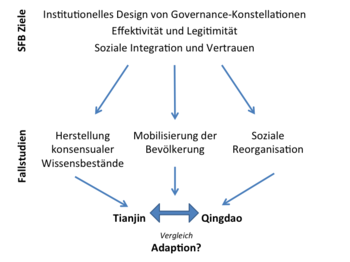Research Project B13 - Adaptation and Legitimation as Factors of Effective Governance in China, 1949-1957
This project investigates the process through which the Communist Party of China (CCP) managed to consolidate its control, minimize the challenges of limited state capacity, and effectively govern at the local level between 1949 and 1957. By means of empirical case studies we aim to uncover the constellations of governance that emerged through this process. Our study focuses on the following three issues: the shaping of popular consciousness to legitimize CCP rule, the methods used to mobilize the population (particularly in campaigns against "social evils" such as drugs, prostitution and gambling), and the process of social reorganization on local level (mainly through work units and residents’ committees). For each of these questions we will conduct archival research in two Northern Chinese cities, Tianjin and Qingdao, in order to produce a total of six case studies. A comparison of the results obtained in the two cities will allow us to shed light on the degree of local variance in the design of governance constellations as well as the impact of local efforts to legitimize CCP rule.
Building on our findings from the first funding period (begun in 2012), which empirically researched refugee governance in Tianjin and Qingdao, we now expand our thematic focus. While maintaining our focus on these two cities, we are narrowing the time frame of our study to concentrate on the early years of the People's Republic of China (PRC) from 1949 to 1957. After the examination of a smaller and more concrete question during the first funding period, we are extending the scope of our investigation to draw broader conclusions on how the CCP was able to consolidate its rule despite the continual constraints posed by limited state capacity.
This project aims, in short, to bring together the empirical findings of individual case studies in order to systematically demonstrate the adaptive nature of governance in the early PRC. Our hypothesis is that the flexibility of the institutional design of governance and the building of empirical legitimacy were central factors in the successful consolidation of CCP rule. Therefore, our project is able to directly contribute to the systematic testing of the core hypotheses of the SFB 700 regarding the relative effectiveness and legitimacy of governance strategies.
Additional Information are available here:

